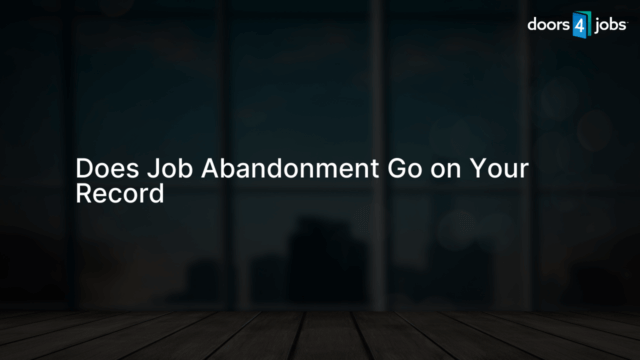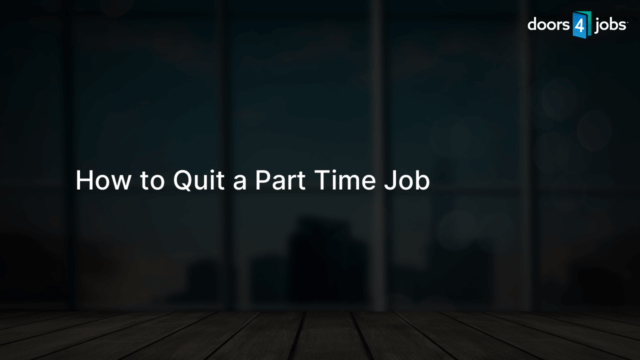No, quitting a job does not go on a formal record. While your employment history might show the duration of your employment, it won’t specifically disclose that you voluntarily quit your previous job. However, potential employers may still ask you about the reason for leaving your previous jobs during interviews.
Understanding the Concept of a “Record”
A job seeker’s record usually refers to their resume, CV, or employment history. This record showcases their experiences, skills, and background to potential employers. It’s important to note that “a record” does not exist in the sense of a permanent or publicly accessible file that tracks all your career choices, such as quitting a job.
Does Quitting Affect Your Employment History?
While quitting a job isn’t explicitly mentioned in your record, your employment history might reflect the job’s duration. This information can indicate to potential employers that you either resigned, were laid off, or dismissed. However, it won’t specify whether you left voluntarily or involuntarily.
Explaining Job Changes
During interviews, potential employers may inquire about your reasons for leaving prior positions. It’s crucial to be honest, but also to frame your decision positively. You might mention seeking new challenges, pursuing personal growth, or desiring a better cultural fit as reasons for quitting a job.
Knowing When It’s Time to Move On
Quitting a job is a personal decision that takes planning and consideration. To determine if resignation is in your best interest, assess factors such as job satisfaction, the work environment, growth opportunities, and your overall health.
Resigning Professionally
If you’ve chosen to quit your job, uphold professional standards by providing ample notice, an official resignation letter, and the willingness to help with the transition process. This approach ensures that you leave on good terms and maintain a positive reputation within your industry.
Your Next Job Search
When submitting job applications after quitting, focus on the skills, experiences, and lessons acquired from your previous positions. Prepare to discuss any gaps in your employment history, and be ready to frame your reasons for leaving previous roles positively. This will demonstrate your professionalism and dedication to career growth.
Dealing with Short-Term Employment
Short-term employment on your resume can raise questions and sometimes cause concerns for potential employers. To tackle this issue, selectively showcase the most relevant positions on your resume, focus on transferable skills, and briefly explain the circumstances around the role. If you’ve held several jobs for short periods, it can be helpful to use a functional or hybrid resume format that emphasizes skills over chronological job history.
Seeking Professional References
Professional references are an essential part of the job application process. After resigning from a job, especially if you left on amicable terms, it’s crucial to maintain relationships with former colleagues and supervisors who can provide positive recommendations. Choose references that can speak to your strengths, work ethic, and contribution to the organization.
Using LinkedIn to Your Advantage
LinkedIn is a powerful platform that can help you showcase your skills, connect with potential employers, and find job opportunities after quitting a job. Ensure your LinkedIn profile is up-to-date, clear, and professional. Regularly engage with your network by sharing relevant industry content or contributing to group discussions. This online visibility will leave a strong impression on potential employers and help you stand out during the job search process.
Addressing Prospective Employers’ Concerns
Job seekers must be prepared to address prospective employers’ concerns and questions during interviews, especially when leaving a job. Rehearse your answers beforehand, so you can respond assertively and with confidence. Remember to articulate your reasons for leaving previous roles positively and convey your commitment to long-term growth, learning, and success in the next potential position.
Professional Networking: The Key to New Opportunities
Networking is a vital aspect of pursuing new job opportunities, especially after quitting a job. Attend industry conferences, career events, and join online communities to expand your network. This proactive approach allows you to keep updated on the latest industry trends, connect with professionals, and discover new job openings. Building a strong network can significantly enhance your job search efforts and help you find the right opportunities after leaving a previous position.
FAQ: Understanding the Implications of Quitting a Job
Here are some common questions and concise answers related to the topic of leaving a job and how it can impact your employment record and job search process.
Will my resume explicitly show that I quit my previous job?
No, your resume will not explicitly show that you quit your previous job. It will only display your employment duration, which may prompt employers to inquire about the reason for leaving during an interview.
Can I be honest about quitting my job during a job interview?
Yes, you should be honest about quitting your job during a job interview. It is crucial to present your decision positively, highlighting personal growth, new opportunities, or a desire for a better work environment as the reasons for your choice.
How can I address gaps in employment due to quitting a job?
Address gaps in employment by emphasizing the skills and experiences acquired during your time off, as well as the reason for the break. Be proactive in explaining how these experiences contribute to your overall qualifications and show that you are ready to re-enter the workforce.
What is the best format to showcase my employment history after quitting multiple jobs?
When you have held several short-term positions, a functional or hybrid resume format is recommended. This format emphasizes your skills, experiences, and relevant achievements rather than focusing on chronological job history, allowing you to better showcase your qualifications.
What strategies can help me find a new job after quitting my previous one?
To find a new job after quitting, focus on leveraging your professional network, using platforms such as LinkedIn, attending industry events, and tailoring your resume and cover letter to specifically target each job posting. Maintain a professional, confident, and positive attitude during the job search process.











